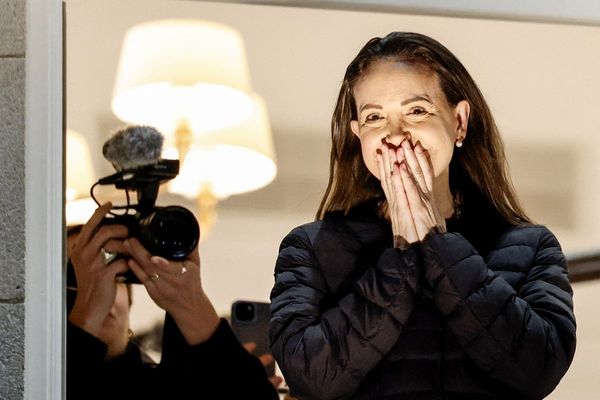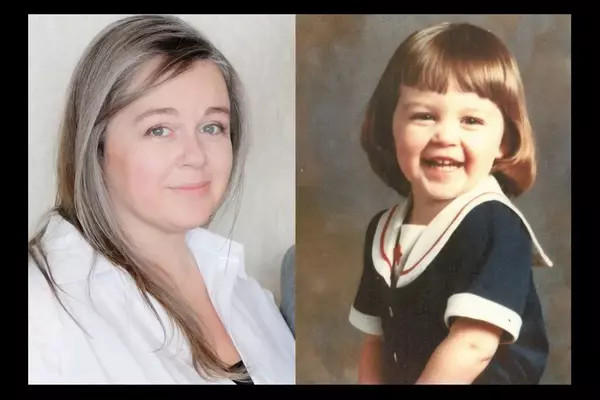
My interest in fossils began at the age of 10 in my back garden in Glastonbury, Somerset, where I discovered ammonites. With hindsight, it wasn’t beauty that drew me to them, but the magic of discovery. I was drawn in by their sheer age, and the unfathomable nature of the distant past.
After my degree in natural sciences in 1965 I wanted to go as far away as I could, so I applied to teach biology in Ghana. It was a fantastic period of my life where I discovered a lot more than rocks in the back garden. After eight years I came back to the UK, and spent much of the next decades raising four children. At times it was a hard life and I put all my dreams of research on hold.
I thought, I’ll enjoy fossiling when I retire at 60 – but I didn’t plan to get so serious about it. I had a vague interest in a local site in Weymouth on the Jurassic Coast. Quickly I could see it was a treasure trove, yet nobody was researching it. Now I’m nearly 80, and I have discovered more than 2,000 fossils after dedicating 20 years of my life to paleontological research. Retirement is really an opportunity to explore new interests – if you’re healthy.
When I’m looking for fossils I get on my hands and knees so I am close to the ground – they’re small, typically 1cm-2cm. I miss things now that in the past I would have seen. The place is very rocky and mucky, and kneeling in the mud at my age is difficult. Sometimes, I wonder if I’ll get up again, or fall over and break a hip.
I can’t collect as I used to because I can’t see so well. Losing my eyesight is not frustrating, as I am passing my knowledge on to my mentee – a serious collector who is younger than me and has brilliant eyesight. He found a pterosaur jaw a month ago which is a very significant and rare find.
I do this work for nothing. Now I am retired I am free to follow leads, and I’ve learned so much from open access papers, the internet and fossil communities on social media. In some cases I have been treated badly by academics who do not want to look at my fossils because they are in a private collection. You do have to have a thick skin. Others have been very supportive.
No academic research has been done on these fossils in Weymouth at all. I have 350 pieces of pterosaur, which were flying reptiles. They flew over these seas for 160m years – that’s a damn sight longer than humans have been around! They were abundant, like seagulls, and now they are extinct, the whole blinking lot of them. My fossils can help to establish what biodiversity was like all those years ago.
Some young PhD students were the first to come over and look at the fossils on my kitchen table back in 2012. I had about 15 marine crocodile teeth that were 153m years old. They were beautiful – perfect, even – often with their full enamel intact.
Those two students were curious and collaborative, and I donated my crocodile teeth to them. They went on to write many papers on crocodylomorphs and I was co-author on two.
I want to inspire people, not because I want to be a saint but because I wish to pass this knowledge on. When I die, everything I spent 20 years learning will go unless I pass this on with enthusiasm. It’s a major national site, and I want to be assured that fossil collectors that go there understand the value of what they’re finding. Otherwise fossils of great significance will be lost, and they shouldn’t be. I’ve just co-authored a book about my work. My record-keeping is meticulous – that’s another characteristic you need. I changed a large upstairs bedroom into a fossil study, and they’re all in there. It’s like a mini-museum.
Fossil collecting is therapeutic; it is in the fresh air, it’s exercise, and then it’s the thrill of discovery. It’s like going on safari – when you don’t find things all the time, it makes it more satisfying when you do. It’s not like Lyme Regis, where big storms throw up huge finds. It’s a gentle site, and things are revealed on a quieter scale. You need determination and patience.
Doing the photoshoot for this article when I’m nearly 80 is cause for a bloody large glass of champagne. It’s ridiculous but I like it. It’s an example of women at work, not dressed up in high heels. It’s an alternative view, which I’m very keen on. I’m advocating for women of all ages in science. What immense fun I’ve had. It’s fun, for goodness sake!
As told to Phoebe Weston
Heather Middleton is a retired teacher and amateur fossil collector based in Dorset







